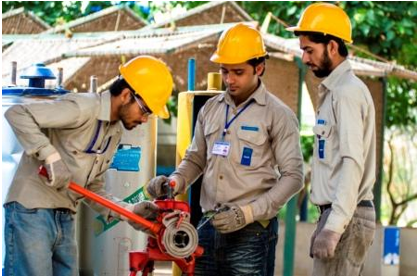آئی این پی ویلتھ پی کے
Ayesha Saba
Experts are increasingly highlighting that Pakistan’s shortage of skilled workers may hinder its development goals. While the country invests in infrastructure and reforms, a stronger focus on workforce training is vital to support growth and global competitiveness.

Talking to WealthPK on the condition of anonymity, an official from the Ministry of Overseas Pakistanis and Human Resource Development said Pakistan’s demographic advantage is rapidly becoming a missed opportunity. “We have a large youth population, but without relevant training and employability skills, this group is at risk of being left behind.
A mismatch between available jobs and skills of the labor force is weakening our competitiveness and slowing down industrial progress,” he remarked. He suggests that these challenges are not solely due to limited capacity, but also reflect broader structural issues in Pakistan’s education and vocational training systems that require careful consideration. He emphasized that a large proportion of our Technical and Vocational Education and Training (TVET) programs are outdated.
“Our academic community is unaware of industry requirements. If we know the industry’s needs, academics can determine which courses to incorporate and which technologies to collaborate on. They should work together to take joint initiatives and share knowledge to boost production and improve quality in the industrial sector,” the official said. Dr. Uzma Zulfiqar, an education policy specialist, cautions that the skilled labor gap has implications for Pakistan’s participation in the global value chains and foreign investment.
“Without a pool of skilled workers, even the best economic policies and incentives will fail to attract sustained foreign investment.” To counter this looming crisis, she recommends quality education, expanding TVET access to the underserved regions, engaging the private sector in curriculum design, and launching nationwide skill certification programs. Without such reforms, Pakistan’s hopes of achieving inclusive growth, industrial modernization, and export-led development may remain out of reach.
Dr Uzma also pointed out geographic and gender disparities in skill development, noting that the rural areas, where poverty and unemployment are more prevalent, often lack access to quality vocational training institutes. “In this technological era, the rural people are still dependent on the old ways of crop cultivation and livestock farming. This lack of advancement makes their products uncompetitive, resulting in farmers losing their market share and earning a decreased profit margin.
“They need to be taught technologically advanced farming methods such as drip irrigation, use of sprinklers and hydroponics. Other than that, the farmers should be educated about better breeding techniques so that their livestock could grow. This would make it more profitable for the farmers,” she said. “To meet our economic goals and build a globally competitive workforce, Pakistan must treat skill development as a national emergency,” she added.
Credit: INP-WealthPk












